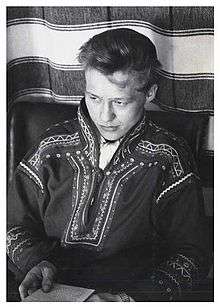Nils-Aslak Valkeapää
Nils-Aslak Valkeapää, known as Áillohaš in the Northern Sami language (23 March 1943 – 26 November 2001), was a Finnish Sami writer, musician and artist. He was born in Enontekiö in Lapland province, Finland. He lived most of his life in Käsivarsi, close to the border of Sweden, and also in Skibotn in Norway. Valkeapää was born to a family of traditional reindeer herders, but was trained as a school teacher. His most well-known international debut was when he performed at the opening ceremony of the 1994 Winter Olympic Games in Lillehammer, Norway. He received the Nordic Council Literature Prize for The Sun, My Father in 1991.
Nils-Aslak Valkeapää | |
|---|---|
 | |
| Born | 23 March 1943 |
| Died | 26 November 2001 (aged 58) Espoo, Finland |
| Nationality | |
| Other names | Áillohaš |
| Occupation | Elementary school teacher, writer, musician, artist and film director |
Works
The traditional Sami singing of the joik was important in his music, as well as in his painting and in written works. He was first recognised as an artist for his joik during the 1960s, with his first recording Joikuja from 1968, which contained modernised joik. Valkeapeää wrote the music to the motion picture Ofelaš, internationally known as The Pathfinder in 1987, which was directed by Nils Gaup.
As a writer, he mainly wrote in Sami with his work translated into other languages and eventually published eight collections of poems. One of his best known is Beaivi áhčážan which has been translated to English, titled The Sun, My Father.
Nils-Aslak Valkeapää died in his sleep in Helsinki on 26 November 2001.[1]
Posthumous publication of Nils-Aslak Valkeapää's work includes two poems included on his godson Niko Valkeapää's eponymous début album. An article published by the Music Information Center Norway stated, "In his trademark, understated style, Niko composes melodies that weave their way into and out of his godfather’s words. Nils Aslak Valkeapää was one of the foremost exponents of Sami art and culture through his long and distinguished career as a poet, composer and artist. Says Niko on his godfather’s influence: 'I can’t deny that Nils Aslak was a role model for me – he was a figure that I would look up to. He has been a source of inspiration and I have included two of his poems on my album to pay homage to him.”[2]
A recording of Nils-Aslak Valkeapää performing his joik forms the centrepiece of "Prayer for the Earth", a track on The Songs of Distant Earth, the 1994 album by British musician Mike Oldfield.
Discography
- Joikuja (1968)
- Juoigamat (1973)
- Vuoi Biret-Maaret, vuoi! (1974)
- De čábba niegut runiidit (1976)
- Duvva, Áilen Niga Elle ja Aillohaš (1976)
- Sámi eatnan duoddariid (1978)
- Sápmi, vuoi Sápmi! (1982)
- Davás ja geassái (1982)
- Beaivi, áhčážan (1988)
- Eanan, eallima eadni (1990)
- Sámi luondu, gollerisku (1992)
- Goase dušše (1994)
- Dálveleaikkat / Wintergames (1994)
Written works

Poems[4]
- Eanni, eannázan (2001) ISBN 82-90625-40-5
- Girddán, seivvodan (1999) ISBN 82-90625-34-0
- The Sun, My Father (1997) ISBN 82-90625-32-4
- In the shadow of midnight sun. Contemporary Sámi prose and poetry (1997) ISBN 82-7374-309-8
- Jus gaccebiehtár bohkosivccii (1996)
- Nu guhkkin dat mii lahka: så fjernt det naere (1994) ISBN 82-90625-20-0
- Trekways of the Wind (1994) Univ of Arizona Press, ISBN 82-90625-21-9
- Aurinko, isäni (1992) Ulkomainen Kirjallisuus, ISBN 978-82-90625-15-8
- Fadir min, solin (1992)
- Solen, min far (1990)
- Vindens veier (1990)
- Beaivi áhcázan (1988)
- Vidderna inom mig (1987)
- Ich bin des windigen Berges Kind (1985)
- Ruoktu váimmus (1985) (combination of earlier poem collections)
- Ádjaga silbasuonat (1981)
- Kevään yöt niin valoisat (1980)
- Lávllo vizár biellocizás (1976)
- Gida ijat cuov’gadat (1974)
References
- Fredriksen, Stein S. (27 November 2001). "En samisk bærebjelke er gått bort". Nordlys (in Norwegian).
- http://www.mic.no/mic.nsf/doc/art2003101614141626442664 Tomas Lauvland Pettersen, "A Search for Identity"
- Larsen, Dan Robert; Balto, Piera (11 April 2013). "Skjulte sin legning til sin død". NRK (in Norwegian). Retrieved 2 November 2018.
- https://web.archive.org/web/20080609053748/http://www.rovaniemi.fi/lapinkirjailijat/enils.htm